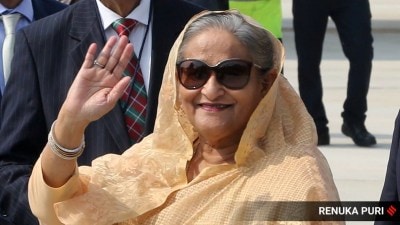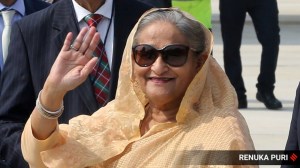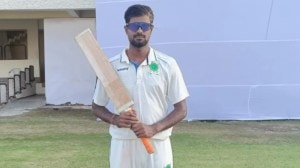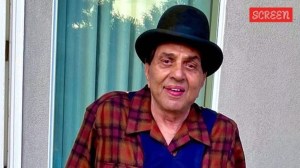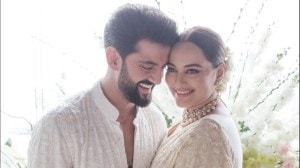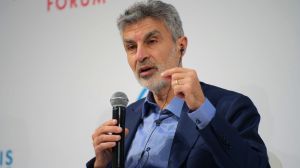Click here to follow Screen Digital on YouTube and stay updated with the latest from the world of cinema.
Haq should not be labelled as a ‘Muslim social drama’, says Suparn Verma: ‘Shazia-Iqbal could be Sunita-Aravind; I steered clear of triple talaq as…’
In an exclusive interview with SCREEN, director Suparn Verma breaks down Haq, its casting, influences on worldbuilding, and why it doesn't go into the triple talaq discourse linked to the Shah Bano case.
 Suparn Verma feels Haq should not be called a 'Muslim social drama'.
Suparn Verma feels Haq should not be called a 'Muslim social drama'.Suparn Verma is back with a solo theatrical release 12 years after his 2013 psychological horror film, Aatma. Since then, most of his work has been on streaming, whether it’s season 2 of Raj & DK’s The Family Man on Prime Video India, two seasons of Rana Naidu on Netflix India, or season 1 of The Trial on JioHotstar. “When I was doing feature films, everyone used to say I’m too Hollywood. Streaming wanted you to be international in your approach, so it freed me from all the labels and pressures,” Suparn tells SCREEN in an exclusive interview.
But his new film, Haq, boasts of an identity poles apart from the international appeal he’s best known for delivering. Inspired from the landmark Shah Bano case in the 1980s, Haq is a courtroom drama that revolves around Shazia (Yami Gautam), a Muslim mother of three who goes to court to claim her right to monthly maintenance from her lawyer-ex-husband Abbas (Emraan Hashmi). In this chat, Varma breaks down his film, decisions behind casting, influences on worldbuilding, and why he chose not to address the triple talaq discourse inextricably attached to the court case.
The aesthetic of Haq seems to be borrowed from Fawad Khan’s popular Pakistani shows like Humsafar (2011) and Zindagi Gulzar Hai (2012). Were they an influence?
No. Maybe, many years ago, I’ve seen just one Pakistani show, where there was a lady doctor with bob cut hair whom everybody had a crush on (Marina Khan from Dhoop Kinare, 1987). But no, Pakistani shows weren’t an influence on Haq. We did a lot of research for designing the aesthetic. For example, I wanted Yami to have a no makeup look with just some kajal, which I’d seen in the inspiration’s look (Shah Bano). Also, she wore just three shades of lipstick because Lakme would sell only three shades in those days. Every summer vacation, I’d go to Delhi and then Bareilly (in Uttar Pradesh), which is my father’s hometown. My father had passed away very early, so my mother made sure I’m always in touch with his side of the family. So, I’ve seen those bylanes of Lucknow, where we shot the film, with the naalis (drains) passing by. I knew the people, the families because in my time, we used to interact with all religions and communities. All festivals were celebrated.
So, Haq was just a reflection of whatever I’d seen visually in the 1970s and ’80s. Also, another thing that I wanted to bring in was the Ganga Jamuna tehzeeb, when Ustad Bismillah Khan would sit on the Ganga banks and play the shehnai. You had Mohammed Rafi sing the best bhajans of all time. Nobody cared about religion. Art had no identity. That’s something that’s stayed with me. Which is why Shazia and Abbas in Haq could very well be Sunita and Aravind. There’s no hijab in the film. In fact, in those days, there was no hijab or skullcaps. It’s post 9/11 that the world changed, and has been continuously changing. When there’s a certain narrative formed, then identities are reinforced because everyone’s feeling scared. But that was a different time. Which is why I deliberately wanted Haq to be an Indian film. Period. We don’t have Hindu social dramas, so why should we have a Muslim social drama? No, that’s not how art works. That’s why Haq is a very Indian film, and deliberately so.

But Haq feels very lived-in despite you or screenwriter Reshu Nath not being from the Muslim community. How did you achieve that?
We went for recce to Lucknow, and spent time with the women there. We got an entire lowdown on how weddings happen there. We had an actual imaam come there to read out the marriage vows or when Yami’s father passes away in Haq, the prayer being said is legit. I wanted to be accurate. Just because you’re in that milieu, the azan doesn’t need to play every now and then. The azan plays only once in the entire film. What are you trying to prove? Don’t give me stereotypes. The only way to start making it real, besides the acting and writing, is to make the ecosystem authentic. When Yami, Emraan and others reached those areas, I could smell Shazia, Abbas, and others living through that.
How different was the Uttar Pradesh of this time to the one you visited every summer during childhood?
In a very different context, I always felt a very deep connect to Egypt. But when I landed in Cairo for the first time, I said, “Where the hell are the pyramids?” They’re one and a half hours outside of the city. It’s a very modern city. Similarly, when you land in Lucknow, it’s a modern city with high rises, flyovers, and metro routes being constructed, just like any metro city in India. It’s only when you start travelling out of the city that you find these time capsules which have been conserved. We shot in these capsules. Yes, we had to still digitally remove the antennas and water tanks. But India still allows you places frozen in a time zone. You’ll have the ring of a mobile phone breaking the reverie, but there are visuals that are there.
 Yami Gautam and Suparn Verma on the sets of Haq.
Yami Gautam and Suparn Verma on the sets of Haq.
Yami Gautam and Emraan Hashmi played very different characters in their last theatrical releases — Article 370 and Ground Zero. How did you zero in on them?
Via photographs. My personal process is the eyes. With Yami, her eyes have a certain light which is very hard to define. Those eyes contain a lot of passion, madness, and vulnerability. Her eyes are like still water. They run so deep that if you tap into them, they give you a Shazia Bano. Yami’s only question after reading the script was: “Who’s playing Abbas?” That’s something, while writing the script, we were breaking our heads over. I needed Abbas to be understood because with Haq, I wanted a conversation. I didn’t want to make a film with a verdict, where I say this is left and right and right and wrong. I want you to have your questions and engage. Abbas is a product of ambition, male ego, and the times when all this was normalized. Emraan is an actor whose charm and intensity we’ve all seen through the years. What if you combine both?
Not too many male actors would play Abbas because he has to concede defeat to the leading lady. Was that a concern for Emraan?
There came a point where I thought I have to protect him as a star by making him not do some things. But he said, “No, I should be the one doing these. It’s my ambition which is making me do this. You’re worried about me being understood? They’ll understand. Leave that to me.” And he took care of it and how. He just had one doubt after reading the script: “How will I be perceived?” My answer to that, in continuation to “trust me,” was if you’re understood, then you don’t have to worry about how you’ll be perceived. If we fail to make the audience understand you, then we’ll open a can of worms.
 Emraan Hashmi and Suparn Verma on the sets of Haq.
Emraan Hashmi and Suparn Verma on the sets of Haq.
Since Haq is inspired from the Shah Bano case, did it have an easy time at the CBFC?
Yes! The CBFC members were technically my first audience. They were so happy seeing the film. They said it’s such a balanced film. It’s a pack of cards. They can’t remove any one thing because the whole pack of cards would collapse. They passed the film without a single cut. UAE passed the film without a cut. It comes down to intention. Ours was to tell a very honest story from the heart. Neither me nor Reshu have any agenda of any kind. We just wear our hearts on our sleeves.
What was your brief to Emraan and Yami for their closing monologues since they were shot in one takes?
I shot both at the end of the shoot. By that time, they were totally in character. The film was a summation of their characters’ journeys. They didn’t have to figure that out. Everything came from within and hit home. It was like a release for both of them. We were rehearsing and tuning the lines and pauses till a week before those scenes. But then I said we’re not touching it anymore. By that time, I wasn’t talking to Yami and Emraan, but Shazia and Abbas.
There’s a red rose that Abbas carries in his pocket like a badge of honour. What does it symbolize?
In the first scene, he gives her a rose to keep in the book. One of the first things she does in her new house is make a rose garden. She also ends up having a blue rose. He wears a rose throughout the film. In the last shot of the film, he takes it out, keeps it, and walks away. Emraan, Yami, and Reshu asked me why. They’re the only three people who know the answers to that from me. They all gave their reasons, which were beautiful. But I haven’t given the reason to anybody since then. I have heard a variety of reasons, and I love them. I can just tell you I’m a huge fan of Gulzar sahab. He was my holy grail while directing this film. Nobody writes and creates relationships on screen like he does, with that depth, intensity, maturity, and complexity. For me, Haq is a tribute to Gulzar sahab.
Do you think Shazia was in a privileged position because her father was supportive despite being a maulvi? A lot of Muslim women in India don’t enjoy that privilege.
If she was in a privileged position, she wouldn’t be fighting. If that was the case, it wouldn’t take a filmmaker 40 years to come along and give her the victory she never got. If you ask me why I end my film at her victory instead of continuing, it’s because I needed that woman, who fought so hard for dignity, to at least have that dignity 40 years later when she walks away victorious. In that rotten life of hers, if she had the support of one father, hell yes she deserves it. Everyone deserves a father like Shazia.
Shah Bano’s son had said that his mother and his father’s second wife were always fighting. Why do you make the second wife in Haq go through a change of heart in the end?
I added that scene later because I realized I wanted to bring in sisterhood. A woman’s worst enemy is a woman, but there’s also no more powerful ally for a woman than another woman. The power of sisterhood is better than the bros. Women are unshakeable. Shazia accepted Saira, but her ego got hurt because she was being treated in a certain way. That’s why she blurted out the truth that he loved her. Shazia went to court for her dignity and self-respect. And Abbas is doing it for his self-respect. It’s all about respect. But when Saira sees what’s happening to this woman with three kids, there has to be a reaction. She has a spine. He shuts her down, but she has an opinion.
Why did you steer clear of the triple talaq discourse in Haq?
That happened much later. It’s anyway a different story. Secondly, I wanted to end on a high. I had the audience weeping their heart out throughout the film. In the end, there’s some relief. If you go home feeling that she won, my film ends there. My journey for her ends there. I never planned to go beyond. There was no next beat. Yes, in supers, I tell you what happened to the actual inspiration (Shah Bano), but this is my Shazia Bano. And my Shazia Bano, she won. What happened to the inspiration? That’s there in text. But I wanted to give that woman victory at least on celluloid and make it complete.


- 01
- 02
- 03
- 04
- 05



